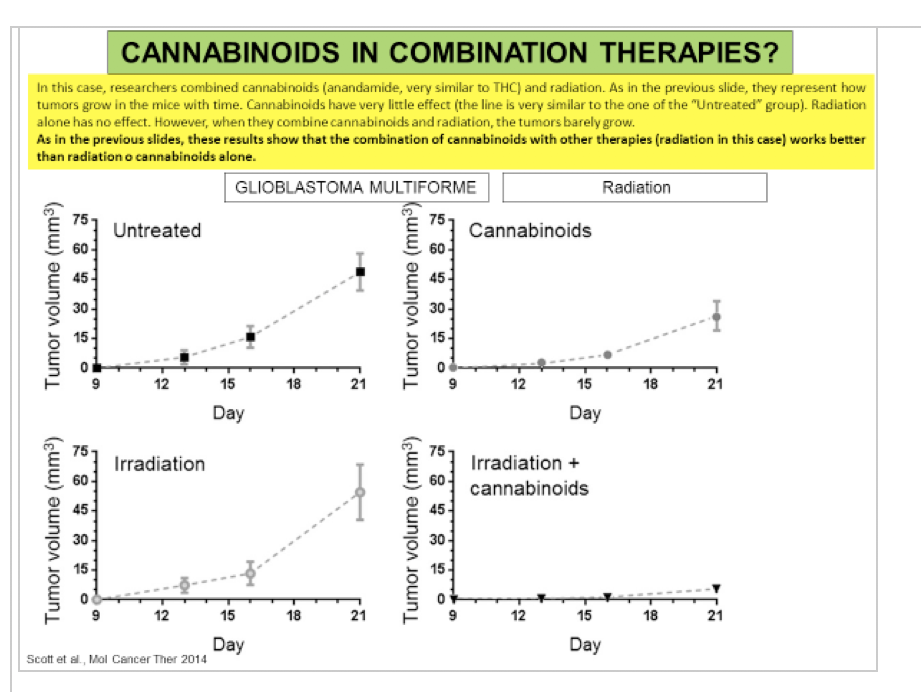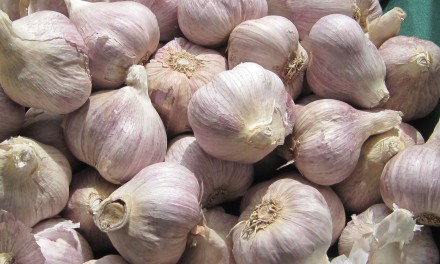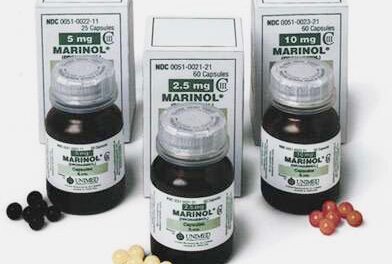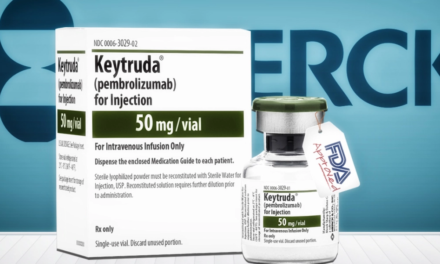A poster at the recent ICRS meeting —Case Report: Clinical Outcome and Image Response of Two Patients After Chemoradiation Treatment in Association With CBD— gave Joe D. Goldstrich, MD, some confirmation for the protocol he has been using for glioblastoma patients.
Here is the poster by Paula B. Dall’Stella, Marcos F. L. Docema, Marcos V. C. Maldaun, Olavo Feher and Carmen L. P. Lancellotti. The authors are in the Department of Neuro-Oncology, Sirio Libanes Hospital, São Paulo, SP, Brazil.
Gliomas, the most common primary brain tumors, account for more than 40% of all CNS neoplasms and are highly resistant to the available therapeutic approaches (Hosli et al., 1998; Galanis and Buckner., 2000a,b). These tumors often have a poor prognosis, with a median survival time of approximately 1 year for patients with high grade gliomas (grade III/IV) (Ohgaki and Kleihues, 2005; Burnet et al., 2007). The Stupp protocol has become standard of care treatment of glioblastoma (GBM), and has led to significant survival improvements (van den Bent MJ et-al 2005). It consists of chemoradiation followed by adjuvant temozolomide, an alkylating agent.
Tumor pseudoprogression (PSD) can occur in up to 30% of the patients, manly MGTM methylated cases. It corresponds to a treatment-related increase of lesion size due to inflammatory responses that simulate the progression of the disease. In almost 60% of the cases, pseudoprogression occurs within the first 3 to 6 months after completing chemoradiation. (Domingues RC et-al 2011, van den Bent MJ et-al 2009, Chang S 2009). Pseudoprogression does not represent the progression of the disease, and is often a marker of longer survival, presumably because it represents a robust response to treatment (Brandes et al 2008).
Cannabidiol is one of the most prevalent natural cannabinoids. It is a nonpsychoactive compound and presents a wide spectrum of pharmacological effects including antiinflammatory, anti-proliferative, anti-invasive, anti-metastatic and pro-apoptotic effects Grotenhermen 2005, Massi et al. 2004, Guzman 2003). Recent discussions also suggest a possible immunomodulation caused by cannabidiol.
The authors describe two patients with confirmed diagnosis of Glioblastoma Multiforme (WHO-IV), both presenting MGMT methylated and IDH-1 mutated who, after an incomplete surgical resection, were submitted to the Stupp protocol associated with cannabidiol (CBD). Both patients presented very satisfactory clinical and imaging responses in periodic evaluations. Right after the chemoradiation, one of the patients presented a very exacerbated and precocious PSD in the MRI, which was resolved in a short period of time. On the other hand, the other patient presented a marked remission of the altered areas in the MRI (figures 1 and 2). Such aspects are not commonly observed in patients only treated with conventional modalities.
This observation could highlight the potential effect of CBD increasing PSD response that could impact survival. Further investigation with more patients with critical molecular analyses should be done.
Dr. Goldstrich Comments:
This is a very interesting paper. The Stupp protocol uses Temozolomide and radiation.
I learned from a presentation by Dr. Christina Sanchez that radiation complements cannabinoids: Her slides on radiation are based on the research of Scott KA, Dalgleish AG, Liu WM. The combination of cannabidiol and Delta9-tetrahydrocannabinol enhances the anticancer effects of radiation in an orthotopic murine glioma model. Mol Cancer Ther. 2014;13:2955–67. doi: 10.1158/1535-7163.MCT-14-0402. [PubMed] [Cross Ref]
We also know that THC complements Temozolomide: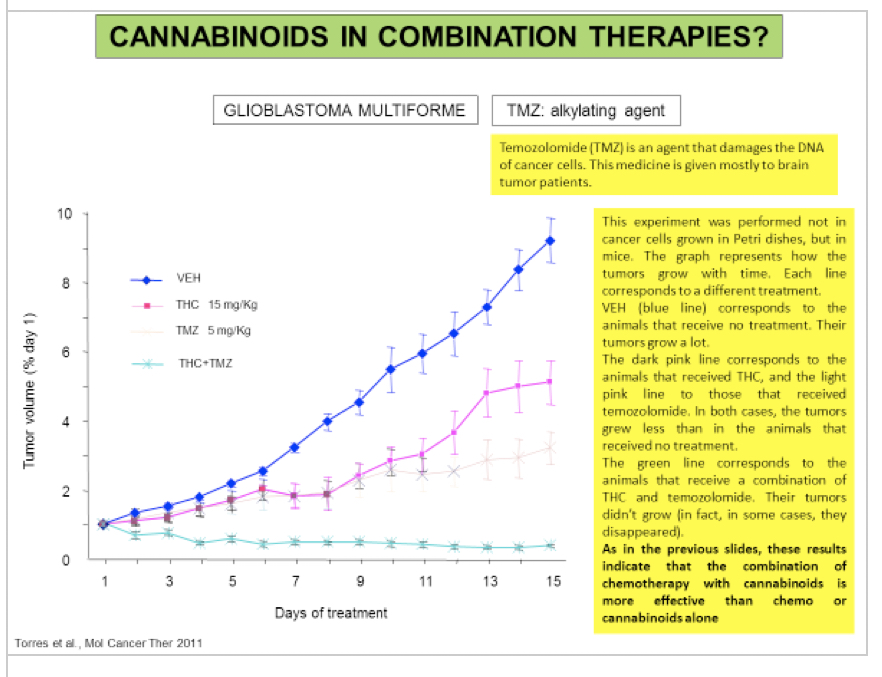
From the ICRS poster by Dall’Stella et al we know that CBD complements radiation and Temozolomide.
Both radiation and CBD attack cancer cells via a pro-oxidative process. See https://www.ncbi.nlm.nih.gov/pmc/articles/PMC4669764/
Based on these integrated concepts, using both THC and CBD when treating glioblastoma in conjunction with temozolomide and/or radiation would seem to take advantage of these potential synergisms. The concomitant use of antioxidants would probably negate some of the potential benefits.
Joe D. Goldstrich, MD, FACC
Dr. Mirage comments:
- I, and other people, have been saying the same thing for years.
- The bit about being a problem with antioxidants is probably more theoretical than real. Plenty of patients are using curcumin and Asian mushrooms concomitantly, without any evidence of interference with tumor regression..
Dr. Goldstrich Adds in Response:
Although the problem with antioxidants is theoretical, there is published research supporting the ability of antioxidants to prevent CBD from killing cancer cells.
http://jpet.aspetjournals.org/content/308/3/838.long
http://www.nature.com/cddis/journal/v6/n1/full/cddis2014566a.html
https://www.ncbi.nlm.nih.gov/pmc/articles/PMC4470774/
Because of their known anticancer activity, I previously suggested curcumin and medicinal mushrooms to all the cancer patients that I advised. However, these compounds have definite antioxidant activity. Singer, working in Dr. Sean McAllister’s laboratory at the Pacific Medical Center, cited in the 2nd reference above, using glioblastoma and glioblastoma stem cells, showed that resistance to glioblastoma therapy can be reduced by increasing reactive oxygen species (ROS) and since curcumin and Asian mushrooms reduce ROS, my reasoning has been that they might attenuate the ability of CBD to induce and sustain ROS.
One recent study with prostate cancer patients treated with radiation and curcumin https://www.ncbi.nlm.nih.gov/pubmed/26771294 showed an increase in total antioxidant capacity following administration of curcumin. In this short-term study, there were no significant outcome differences between the treatment group and the placebo group at 3 months.
I’d love to see the CBD- antioxidant experiments repeated using curcumin instead of alpha-tocopherol. I’d love to see clinical trials of cannabinoids with and without curcumin and Asian mushrooms. I’d love to see published research showing that curcumin and Asian mushrooms do not interfere with tumor regression. In the meantime, I plan on continuing to suggest that antioxidant supplements may be counterproductive.
JDG


